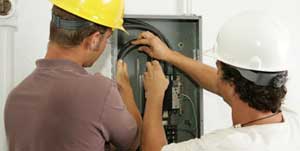Electrical Fitter
Tasks & duties

Electrical fitters may do some or all of the following:
-
study and interpret electrical wiring diagrams
-
install and maintain electrical wiring and equipment
-
repair or replace electrical wiring and equipment
-
test electrical wiring and equipment for safety
-
keep records of the problems they find with electrical wiring and equipment and the servicing they carry out
Skills & knowledge

Electrical fitters need to have:
-
knowledge of electrical theory
-
knowledge of electrical legislation, codes, and standards of practice
-
knowledge of how to install electrical wiring and equipment
-
excellent communication skills
-
the ability to read and interpret wiring diagrams
-
good problem-solving skills
-
maths skills
-
record-keeping skills
-
first aid and cardio-pulmonary resuscitation (CPR) skills
-
knowledge of safety procedures
Entry requirements
To become an electrical fitter you need to complete an apprenticeship and gain a National Certificate in Electricity Supply (Electrical Fitter) Level 4. Further information on training is available from the Electricity Supply Industry Training Organisation (ESITO).
Electrical fitter apprenticeships are part of the Modern Apprenticeships scheme, which is for people aged 16 to 21. For further information go to the Modern Apprenticeships website.
Secondary education
Sixth Form Certificate or NCEA Level 2 English, science and maths are required.
Tertiary education
A pre-apprenticeship National Certificate in Electricity Supply Level 2 is recommended because it is helpful to employers if apprentices have some background knowledge of electrical theory and safety before starting employment. These pre-apprenticeship programmes can be completed full-time at a polytechnic.
Training on the job
During your apprenticeship you are supervised by a registered electrical fitter and your skills are assessed. Electrical fitters may undertake first aid and safety courses as part of their on-the-job training.
Registration
Electrical fitters need to be registered with the Electrical Workers Registration Board. To apply for registration you need to have a National Certificate in Electricity Supply (Electrical Fitter) Level 4 and pass an electrical regulations exam.
Useful experience
Experience in the electricity supply or building construction industries may also be useful.
Related courses
Electrical Engineering
Electrical Fitting, Electrical Mechanics
Power Line Installation and Maintenance
For more information, please refer to Career Services.
Document Actions
